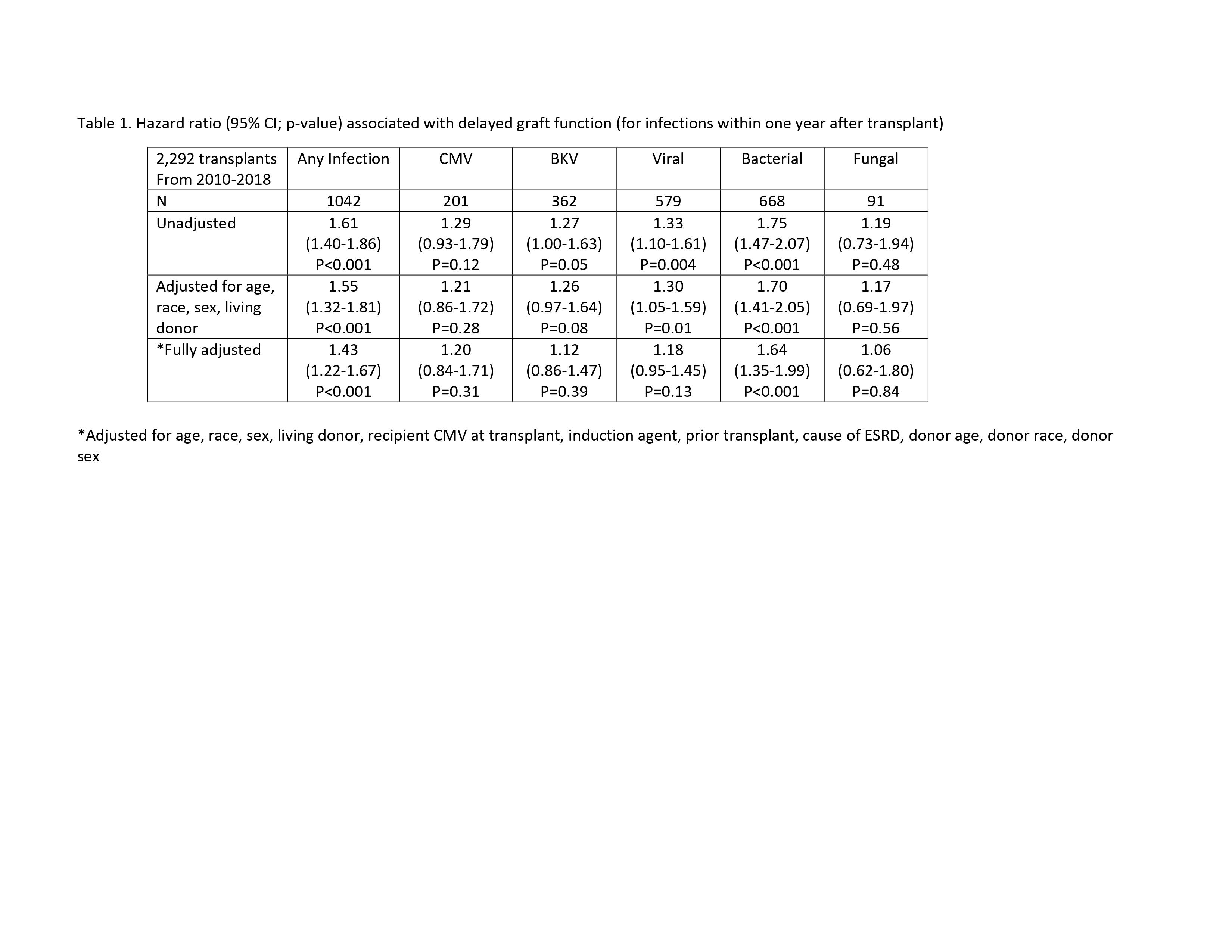Delayed Graft Function in Kidney Transplant Recipients is Associated with an Increased Risk f Post-Transplant Infections
V. Manchala, B. Muth, E. Yousif, J. Turk, J. Blazel, M. Bloom, N. Garg, F. Aziz, M. Mohamed, A. Djamali, D. Mandelbrot, B. Astor, S. Parajuli
UWSMPH, Madison, WI
Meeting: 2022 American Transplant Congress
Abstract number: 1616
Keywords: Graft function, Infection, Kidney transplantation
Topic: Clinical Science » Infection Disease » 24 - All Infections (Excluding Kidney & Viral Hepatitis)
Session Information
Session Name: All Infections (Excluding Kidney & Viral Hepatitis) IV
Session Type: Poster Abstract
Date: Tuesday, June 7, 2022
Session Time: 7:00pm-8:00pm
 Presentation Time: 7:00pm-8:00pm
Presentation Time: 7:00pm-8:00pm
Location: Hynes Halls C & D
*Purpose: Delayed graft function (DGF) is a known complication among kidney transplant recipients (KTRs) and is associated with decreased graft survival, increased rejection, and increased costs. DGF may also lead to an activation and dysregulation of the immune system. There is limited data on the association beteen DGF and recipient infection rates.
*Methods: We reviewed all adult KTRs transplanted between 2010 to 2018 at our center, evaluating the impact of DGF on infections within one-year post-transplant. Specifically, we looked for any infections, CMV infection, BK viremia, other viral infections, bacterial and fungal infections.
*Results: A total of 2292 kidney transplants were performed during the study period, and 465 (20.3%) had DGF. A total of 1042 (45.4%) KTRs had any infections within one-year post-transplant. DGF was significantly associated with increased risk of any infection (hazard ratio [HR]: 1.61; 95% CI: 1.40-1.86; p <0.001) in unadjusted analysis (Table 1). DGF remained significantly associated with any infection (adjusted HR [aHR]: 1.43; 95% CI: 1.22-1.67; p <0.001)in models adjusting for potential confounders. DGF was specifically associated with higher risk of bacterial infections (mainly UTIs) (aHR: 1.64, 95% CI: 1.35-1.99 p <0.001). The incidence of CMV, BKV, and fungal infection were higher in those with DGF, but these differences did not reach statistical significance. Similar associations were found in models censoring patients at the time of rejection.
*Conclusions: Patients with DGF have an increased risk of rejection and infection. Close monitoring and follow up is important to mitigate these complications.
To cite this abstract in AMA style:
Manchala V, Muth B, Yousif E, Turk J, Blazel J, Bloom M, Garg N, Aziz F, Mohamed M, Djamali A, Mandelbrot D, Astor B, Parajuli S. Delayed Graft Function in Kidney Transplant Recipients is Associated with an Increased Risk f Post-Transplant Infections [abstract]. Am J Transplant. 2022; 22 (suppl 3). https://atcmeetingabstracts.com/abstract/delayed-graft-function-in-kidney-transplant-recipients-is-associated-with-an-increased-risk-f-post-transplant-infections/. Accessed February 25, 2026.« Back to 2022 American Transplant Congress

